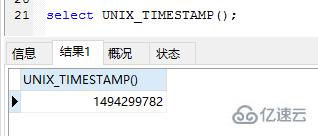What are the date and time types and formatting methods in MySQL

[1] Date and time types in MySQL
In MySQL, date, datetime, time, year and timestamp are commonly used time types
| Data type | Occupied bytes | Minimum value | Maximum value | A zero value represents |
|---|---|---|---|---|
| date | 4 | 1000-01-01 | 9999-12-31 | 0000-00-00 |
| datetime | 8 | 1000-01-01 00:00:00 | 9999-12 -31 23:59:59 | 0000-00-00 00:00: 00 |
| timestamp | 4 | 19700101080001 | Sometime in 2038 | 0000000000000000 |
| time | 3 | -838:59: 59 | 838:59:59 | 00:00:00 |
| year | 1 | 1901 | 2155 | 0000 |
Detailed explanation
##datetime
: Time date type, the format is YYYY-mm-dd HH:ii:ss , the representation range is from 1000 to 9999. But there is a zero value, 0000-00-00 00:00:00;date
: Date is the date part of datetime;time
: time (segment), between a specified interval, from - time to time (represented by negative time);timestamp
: Timestamp, not a conventional timestamp (such as: 14253685), the range is '1970-01-01 00:00:00' to 2037. The format is YYYY-mm-dd HH:ii:ss,The format is completely consistent with datetime;year
:yy and yyyy,yyyy The range of is 1901-2155, and the range of yy is 1970-2069.
create table my_date(
d1 datetime,
d2 date,
d3 time,
d4 timestamp,
d5 year
)charset utf8;
desc my_date
Copy after login
As shown in the figure below: year defaults to 4 digits, that is, YYYY; timestamp cannot be empty, and there is The default value is to refresh this data column when creating new records and modifying existing records. create table my_date( d1 datetime, d2 date, d3 time, d4 timestamp, d5 year )charset utf8; desc my_date

insert into my_date VALUES('2015-09-28 11:50:36','2015-09-28','11:50:54','2015-09-28 11:51:08','2015'); insert into my_date VALUES('2015-09-28 11:50:36','2015-09-28','-11:50:54','2015-09-28 11:51:08','2015');-- -11 insert into my_date VALUES('2015-09-28 11:50:36','2015-09-28','-211:50:54','2015-09-28 11:51:08','2015');-- -2 11 insert into my_date VALUES('2015-09-28 11:50:36','2015-09-28','-2 11:50:54','2015-09-28 11:51:08','2015');-- -2过去两天 #year用69标识-2069 insert into my_date VALUES('2015-09-28 11:50:36','2015-09-28','11:50:54','2015-09-28 11:51:08','69');-- 69 #year用70标识-1970 insert into my_date VALUES('2015-09-28 11:50:36','2015-09-28','11:50:54','2015-09-28 11:51:08','70');-- 70


update my_date set d1 = SYSDATE() where d5=69; select * from my_date

select UNIX_TIMESTAMP();

Test Example
4.1 Query the current time
SELECT SYSDATE() from dual;

4.2 Insert the current time into the above types of columns
insert INTO `user` (name,number,date,datetime,timestamp,time,year) VALUES ( 'Loum',3,SYSDATE(),SYSDATE(),SYSDATE(),SYSDATE(),2016 );

4.3 The length bit of datetime type in mysql The number
is as follows. Usually the length of the datetime type in our MySQL is designed to be 0 by default:`work_time` datetime(0) DEFAULT NULL COMMENT '清收时间',
`work_time` datetime(2) DEFAULT NULL COMMENT '清收时间', # datetime(n)中的n最大值为6 `work_time` datetime(6) DEFAULT NULL COMMENT '清收时间',
2020-08-29 12:52:16.01You will find that there is a decimal point at the end and the numbers after the decimal point will correspond to the corresponding digits - this is called nanoseconds.2020-08-29 12:52:16.014057
The summary is as follows:
date
: only date, no time;datetime
: There is time and date;time
: Only time, accurate to minutes and seconds;timestamp
: timestamp, accurate to minutes and seconds;year
: year, such as 2002, if written is 2002-01-15, calculation will be performed, and the insertion result is 1986
DATE_FORMAT( ) function
You can use the date_format() function to convert time.SELECT DATE_FORMAT(SYSDATE(),'%Y-%m-%d %H:%i:%s') from dual;

date_format( ) 转换格式
| 格式 | 描述 |
|---|---|
| %a | 缩写星期名 |
| %b | 缩写月名 |
| %c | 月,数值 |
| %D | 带有英文前缀的月中的天 |
| %d | 月的天,数值(00-31) |
| %e | 月的天,数值(0-31) |
| %f | 微秒 |
| %H | 小时 (00-23) |
| %h | 小时 (01-12) |
| %I | 小时 (01-12) |
| %i | 分钟,数值(00-59) |
| %j | 年的天 (001-366) |
| %k | 小时 (0-23) |
| %l | 小时 (1-12) |
| %M | 月名 |
| %m | 月,数值(00-12) |
| %p | AM 或 PM |
| %r | 时间,12-小时(hh:mm:ss AM 或 PM) |
| %S | 秒(00-59) |
| %s | 秒(00-59) |
| %T | 时间, 24-小时 (hh:mm:ss) |
| %U | 周 (00-53) 星期日是一周的第一天 |
| %u | 周 (00-53) 星期一是一周的第一天 |
| %V | 周 (01-53) 星期日是一周的第一天,与 %X 使用 |
| %v | 周 (01-53) 星期一是一周的第一天,与 %x 使用 |
| %W | 星期名 |
| %w | 周的天 (0=星期日, 6=星期六) |
| %X | 年,其中的星期日是周的第一天,4 位,与 %V 使用 |
| %x | 年,其中的星期一是周的第一天,4 位,与 %v 使用 |
| %Y | 年,4 位 |
| %y | 年,2 位 |
str_to_date()函数
字符串转换为date:
str_to_date( '2016-12-15 16:48:40', '%Y-%m-%d %H:%i:%S' )
The above is the detailed content of What are the date and time types and formatting methods in MySQL. For more information, please follow other related articles on the PHP Chinese website!

Hot AI Tools

Undresser.AI Undress
AI-powered app for creating realistic nude photos

AI Clothes Remover
Online AI tool for removing clothes from photos.

Undress AI Tool
Undress images for free

Clothoff.io
AI clothes remover

AI Hentai Generator
Generate AI Hentai for free.

Hot Article

Hot Tools

Notepad++7.3.1
Easy-to-use and free code editor

SublimeText3 Chinese version
Chinese version, very easy to use

Zend Studio 13.0.1
Powerful PHP integrated development environment

Dreamweaver CS6
Visual web development tools

SublimeText3 Mac version
God-level code editing software (SublimeText3)

Hot Topics
 PHP's big data structure processing skills
May 08, 2024 am 10:24 AM
PHP's big data structure processing skills
May 08, 2024 am 10:24 AM
Big data structure processing skills: Chunking: Break down the data set and process it in chunks to reduce memory consumption. Generator: Generate data items one by one without loading the entire data set, suitable for unlimited data sets. Streaming: Read files or query results line by line, suitable for large files or remote data. External storage: For very large data sets, store the data in a database or NoSQL.
 How to optimize MySQL query performance in PHP?
Jun 03, 2024 pm 08:11 PM
How to optimize MySQL query performance in PHP?
Jun 03, 2024 pm 08:11 PM
MySQL query performance can be optimized by building indexes that reduce lookup time from linear complexity to logarithmic complexity. Use PreparedStatements to prevent SQL injection and improve query performance. Limit query results and reduce the amount of data processed by the server. Optimize join queries, including using appropriate join types, creating indexes, and considering using subqueries. Analyze queries to identify bottlenecks; use caching to reduce database load; optimize PHP code to minimize overhead.
 How to use MySQL backup and restore in PHP?
Jun 03, 2024 pm 12:19 PM
How to use MySQL backup and restore in PHP?
Jun 03, 2024 pm 12:19 PM
Backing up and restoring a MySQL database in PHP can be achieved by following these steps: Back up the database: Use the mysqldump command to dump the database into a SQL file. Restore database: Use the mysql command to restore the database from SQL files.
 How to insert data into a MySQL table using PHP?
Jun 02, 2024 pm 02:26 PM
How to insert data into a MySQL table using PHP?
Jun 02, 2024 pm 02:26 PM
How to insert data into MySQL table? Connect to the database: Use mysqli to establish a connection to the database. Prepare the SQL query: Write an INSERT statement to specify the columns and values to be inserted. Execute query: Use the query() method to execute the insertion query. If successful, a confirmation message will be output.
 How to fix mysql_native_password not loaded errors on MySQL 8.4
Dec 09, 2024 am 11:42 AM
How to fix mysql_native_password not loaded errors on MySQL 8.4
Dec 09, 2024 am 11:42 AM
One of the major changes introduced in MySQL 8.4 (the latest LTS release as of 2024) is that the "MySQL Native Password" plugin is no longer enabled by default. Further, MySQL 9.0 removes this plugin completely. This change affects PHP and other app
 How to use MySQL stored procedures in PHP?
Jun 02, 2024 pm 02:13 PM
How to use MySQL stored procedures in PHP?
Jun 02, 2024 pm 02:13 PM
To use MySQL stored procedures in PHP: Use PDO or the MySQLi extension to connect to a MySQL database. Prepare the statement to call the stored procedure. Execute the stored procedure. Process the result set (if the stored procedure returns results). Close the database connection.
 How to create a MySQL table using PHP?
Jun 04, 2024 pm 01:57 PM
How to create a MySQL table using PHP?
Jun 04, 2024 pm 01:57 PM
Creating a MySQL table using PHP requires the following steps: Connect to the database. Create the database if it does not exist. Select a database. Create table. Execute the query. Close the connection.
 The difference between oracle database and mysql
May 10, 2024 am 01:54 AM
The difference between oracle database and mysql
May 10, 2024 am 01:54 AM
Oracle database and MySQL are both databases based on the relational model, but Oracle is superior in terms of compatibility, scalability, data types and security; while MySQL focuses on speed and flexibility and is more suitable for small to medium-sized data sets. . ① Oracle provides a wide range of data types, ② provides advanced security features, ③ is suitable for enterprise-level applications; ① MySQL supports NoSQL data types, ② has fewer security measures, and ③ is suitable for small to medium-sized applications.






